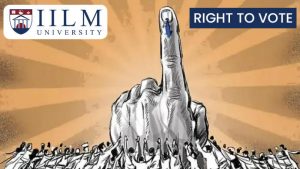– Authored by Prof. (Dr) Asha Verma, Dean, IILM Law School, IILM University Gurugram
Adjudging the issue of allowing a candidate for contesting for more than one seat as a “matter of legislative policy,” the SC on Thursday rejected a plea filed by BJP leader Ashwini Upadhyay challenging the Section 33(7) of the Representation of Peoples Act 1951.
A bench of CJI DY Chandrachud, Justices JB Pardiwala and PS Narasimha said, “Permitting a candidate for contesting for more than one seat is a matter of legislative policy since ultimately its parliament’s will on whether the political democracy is furthered by granting such choice.”In the process of elaborating the ratio behind the judgment, the CJI made a remark which finds its location right in the middle of ratio decidendi and obiter dicta. To the arguments that Section 33(7) is restrictive in nature the CJI responded that:
“It is not a restriction, it’s a facilitative measure…There are some judgments that say that the Right to Vote is only a statutory right and not a constitutional right. But no, it is a constitutional right because it is covered under the purview of Article 19(1) (a), i.e., the right of expression, the right of people to elect, and for people to vote.” However, he did not elaborate further on this point as it was drifting from the core issue before the Court.
This statement holds to potential of rekindling the debate behind the true nature of the right to vote. While prior judgments have signaled towards the right to vote being a fundamental right, it has been a recent phenomenon that it has been pronounced to be an extension of the freedom of speech and expression as prescribed by the Article 19 of the Constitution of India. This line of reasoning aligns with the spirit of democracy as well. As a democratic creature people express their political will through the votes that they cast. Each vote is essentially a statement to the effect that “I want this candidate to represent my political will.”
The right to vote is provided under the purview of Article 326 of the Indian Constitution. A liberal interpretation of Article 326 provides that the elections to the House of the People and to the Legislative Assembly of every State shall be on the basis of adult suffrage, which means every adult citizen of India has the right to vote. However, the right to vote is explicitly provided under the provisions of the Representation of the People Act, 1951 that incorporate the statutory framework for the conduct of elections in India and also reinforce the constitutional right to vote.
This dual source of authority has often landed the true nature of the right to vote into a zone of ambiguity. Is it a constitutional energy that can be identified with Article 19 or is it a statutory expression under the Representation of Peoples Act 1951. If former is the case then would this line of jurisprudence open gates for the resolution of the age old debate of prisoner’s right to vote?
The observations made by the CJI definitely hints towards a shift in the jurisprudence regarding the right to vote but it shall take an unequivocal judicial pronouncement to put an end to the judicial debate.
As per the Indian Constitution, every Indian citizen who is of sound mind is given a universal voting right. Article 326 deals with the same & in 1988, the 61st amendment was passed that lowered the voting age of elections to the Lok Sabha and to the Legislative Assemblies of States from 21 years to 18 years & also gave that no one can be discriminated against on the basis of religion, caste, creed, economic status, etc. In this article, we will be discussing the right to vote in India.
History of voting rights
Going back to the 19th century, several countries’ voting rights were given on the grounds of race, gender, social class & wealth. Presently, if people are not interested in any of the candidates then there is NOTA (explained below in this article). But in such a case, denying voting directly means that the person is not interested in the country’s development as in India, almost everyone gets the right to vote after 18 years of age.
- Did you know the reason behind this was that there had been only one form of tax; property tax? Only the people who paid taxes were allowed to vote.
- Even, in the countries like the US, there was discrimination on the basis of skin colour. Also, countries like Canada and Australia did not give voting rights to indigenous people.
- Until the 20th century, there were countries where voting rights were given on the basis of one’s literacy level.
- The voting age prevalent in countries like Austria, Brazil and Argentina including India is 16 years.
Also, the 61st Amendment of the Constitution lowered the voting age of elections to the Lok Sabha and to the Legislative Assemblies from 21 to 18 years which was done by amending Article 354 of the Constitution.
Article 21 of the UDHR (Universal Declaration of Human Rights) states that “everyone has a right to take part in the government of his/her country, directly/through freely chosen representatives”.
Voting might be getting differing judicial interpretations in due course of time; it is nevertheless an undisputed way of voicing out your political opinions. The point of discourse remains whether it forms the part of one of our fundamental rights or is it a mere statutory right ensured by the representation of people’s Act. A clarification on this point can open the doors of new branches of jurisprudence regarding electoral laws in India and the litigation that centers the idea of election.





















































